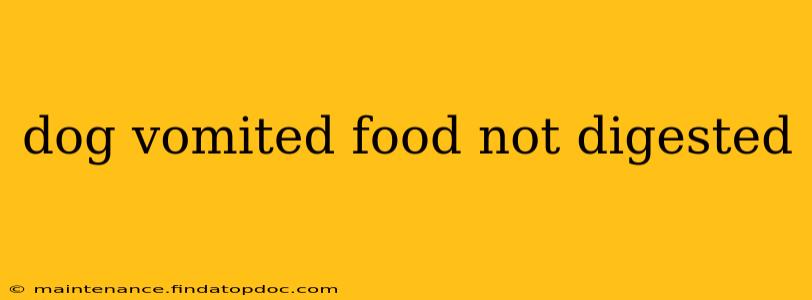It's alarming to find your dog has vomited undigested food. While occasional vomiting is normal, repeated or concerning instances require attention. This comprehensive guide explores the potential causes of your dog vomiting undigested food, helping you understand when it's a simple issue and when veterinary intervention is necessary.
Why is My Dog Vomiting Undigested Food?
Several factors can contribute to a dog vomiting undigested food. These range from minor dietary indiscretions to more serious underlying health problems. Let's explore some common causes:
- Eating Too Fast: Many dogs gobble their food down without properly chewing. This can lead to undigested food passing through their system too quickly, resulting in vomiting.
- Dietary Changes: Introducing a new food too abruptly can upset a dog's stomach and cause vomiting of undigested food. Always transition to new foods gradually.
- Food Allergies or Intolerances: Certain ingredients in your dog's food might trigger an allergic reaction or intolerance, leading to vomiting. Common culprits include wheat, dairy, soy, and chicken.
- Infections: Viral or bacterial infections can cause vomiting and diarrhea, often resulting in the expulsion of undigested food.
- Parasites: Internal parasites like worms can irritate the gastrointestinal tract, leading to vomiting and other digestive issues.
- Gastrointestinal Issues: Conditions like pancreatitis, inflammatory bowel disease (IBD), or other gastrointestinal disorders can significantly impact digestion, often resulting in vomiting undigested food.
- Obstructions: If your dog has swallowed something non-digestible that's blocking their digestive tract, this can cause vomiting of undigested food. This is a serious emergency.
- Stress or Anxiety: Stress and anxiety can manifest in various ways, including digestive upset and vomiting.
- Toxicity: Ingestion of toxic substances can cause severe vomiting, often including undigested food.
How Often is Vomiting Undigested Food Normal?
Occasional vomiting of undigested food, especially after a particularly large meal or a rapid eating session, isn't usually cause for immediate concern. However, if your dog is vomiting undigested food frequently, or if the vomit contains blood, bile, or other unusual substances, veterinary attention is crucial.
What Should I Do If My Dog Vomits Undigested Food?
If your dog vomits undigested food once or twice, observe them closely. Ensure they have access to fresh water and a comfortable resting place. However, if the vomiting is persistent, accompanied by other symptoms (lethargy, diarrhea, loss of appetite), or if you suspect they've ingested something toxic, contact your veterinarian immediately.
My Dog Vomited Undigested Food and Now Has Diarrhea: What Does This Mean?
Vomiting and diarrhea together often indicate a more serious issue, potentially an infection or inflammatory bowel disease. Seek veterinary attention without delay.
My Dog is Vomiting Undigested Food and Acting Lethargic: Is This Serious?
Lethargy in conjunction with vomiting is a significant warning sign. It suggests your dog may be unwell and requires veterinary examination. Don't delay seeking professional help.
When Should I Take My Dog to the Vet for Vomiting Undigested Food?
Seek veterinary care immediately if your dog exhibits any of the following:
- Frequent vomiting: More than a couple of episodes.
- Vomiting blood or bile.
- Lethargy or weakness.
- Loss of appetite.
- Diarrhea.
- Abdominal pain.
- Dehydration (sunken eyes, dry gums).
- Suspected ingestion of a toxic substance.
This information is for general knowledge and does not substitute professional veterinary advice. Always consult your veterinarian for any concerns regarding your dog's health. Early intervention is crucial for the best possible outcome.
